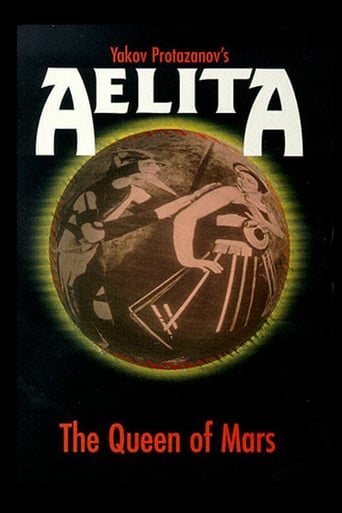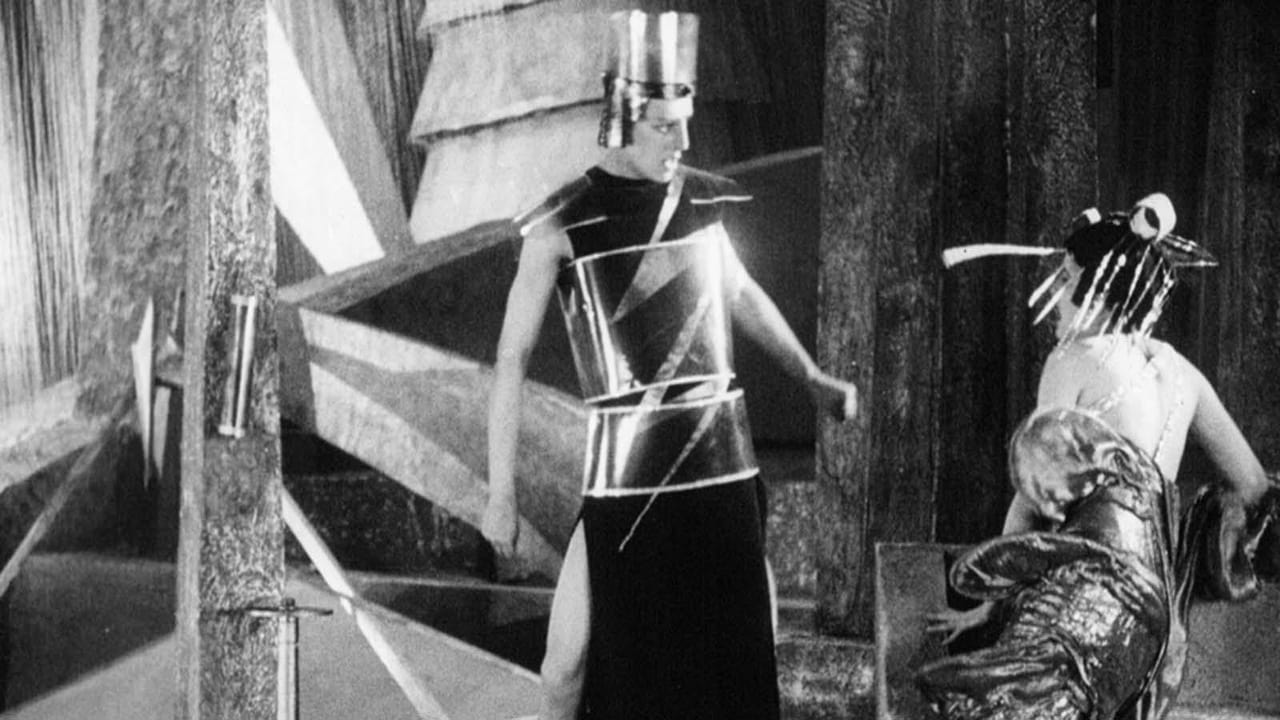Emil Bakkum
Russian films from the era of Leninism, before the fall of the wall, continue to fascinate me. For that reason I bought the DVD Aelita, without really knowing the plot. At the time, IMDb was still a big unknown. How dumb can you be? Luckily, I gambled right, because Aelita is quite charming (although she appears to have three breasts). Let me give some, hopefully appetizing, comments. The film is produced during the first years of the Russian revolution, when there is some idealism left, and the Stalinist terror, dogmatism and censorship are yet in their infancy. The film even dares to advocate some freedom of speech. A second advantage is the absence of the adamant (= the very first insect) realism, that prevails in the documentary but terrible plots of Eisenstein (Strike, Potemkin). In fact the narrative is fairly subtle and multi-layered, with a realistic layer, a dramatic layer, and a fairy tale. In my humble opinion the realistic part is the most interesting. We witness the rising Soviet society, just after the civil war has essentially come to a conclusion. The soldiers return home, and life again takes its normal course. The Leninists and Soviet leaders begin to organize their new society. The planning starts with the distribution among the people of the production, for the time being in kind. It is still a diet, meaning die with a t, with insufficient proteins, meaning in favor of young people. The housing is reorganized, and the common people are lodged in the former gentleman's houses. It reminds of this other giant epos, Doctor Zhivago. The bourgeois and nobility are ostracized (reduced to the size of an ostrich), and mourn their lost wealth. In secret they try to continue their old way of living. Some of these former rich become engaged in illegal and even criminal activities. Money is not everything, but it keeps the kids in touch. Fortunately the main characters of Aelita are decent workers and engineers. The dramatic part shows the consequences of jealousy in a workers marriage. I am not an expert on the subject, but I suppose that this part intends to describe the evils of the bourgeois life style and morals. Eventually we learn, that this sad story line only exists in the imagination of our sympathetic "hero". Leninism is the catalyst (names of cows written in alphabetical order) of cooperation, honesty and trust. Finally, the fairy tale part is a parable of the proletarian revolution, but in an imaginary world. Here the revolution of the workers is led by a king, a bit like in "Metropolis" - indeed Aelita does not excel in originality. Since the workers do not make their own revolution, they become the victim of a bourgeois betrayal - unlike the Metropolis plot. They are just instrumental in a regime change in the bourgeois system itself. Obviously this is meant to be an arraignment (stormy weather). Fortunately in the end the main characters are lucky enough to find themselves back in the real Soviet world, miserable though it may be. What more do you want from a Leninist film? If you prefer modern versions of the Leninist ideology, I recommend "The Garage" or "Moscow doesn't believe in tears". In addition many of my reviews concern Leninist films from East-Germany. Oh and unless you are totally bored, don't forget to check off "useful: yes".
Igenlode Wordsmith
"Aelita" was screened as part of the National Film Theatre's science fiction season, but I can't help fearing that anyone who came to see it in the expectation of Martian adventures would probably have been very disappointed. (Edit: having read a selection of IMDb reviews, I gather this was all too correct, alas...) It certainly wasn't what I was expecting, but I actually enjoyed it a great deal for what it is: basically, an ordinary domestic drama of life in the undernourished, overcrowded post-war Moscow of 1921, with its black-marketeers, buffoons and ambitious dreamers. Intercut with this are the protagonist's imaginations of a stylised, balletic Mars, where the wilful figurehead Queen becomes fascinated with this alien Earthman she has never met; the more frustrating his day-to-day life becomes, the more he takes refuge in these plans and visions, and finally the two worlds become mingled entirely as he seeks escape in interplanetary flight.The obvious comparisons to make are with Fritz Lang's "Metropolis" and H.G.Wells' "Things to Come"; I have to say that I actually found "Aelita" as visually inventive in its science-fiction sections as either of these -- and considerably more enjoyable. It has the human dimension and the humour that both of the former worthy sagas lack; for example, the soldier Gussev is obliged to turn up at the last minute for blast-off wearing women's clothing, because his wife has locked up his own equipment in an attempt to keep him from making the trip! And it benefits from the well-worn tactic of introducing recognisably contemporary characters into its alien setting to serve as audience identification figures; the dream-structure also allows it to get away with a good deal in the way of events that seem oddly arbitrary or clichéd at the time, while explaining them later. With hindsight I suspect that some of the revolutionary grandiloquence we laughed at was actually intended to be ridiculous (Protazanov had been a successful pre-revolutionary director who had only just been induced to return to Soviet Russia, and there is a striking sequence in "Aelita" where characters hark back wistfully to the 'old days'): the film has a good Soviet moral, but not the one you are led to expect, and it knows how to deflate the bubble of wild fantasy.Nikolai Tsereteli and Vera Kuindzhi make an attractive and sensitive leading couple as the engineer and his wife, although the latter suffers from the limitations of the orthochromatic film stock of this era which tends to bleach out blue eyes altogether, to occasionally grotesque effect. Pavel Pol is also impressive as Erlich, the agreeable con-man who is billeted on the couple, while Igor Ilyinsky and Nikolai Batalov provide comic relief without becoming tedious.The space technology shown has a definite air of Jules Verne, but take-off is effectively suggested using blurring camera views rather than extensive model work, and the characters stumble from their ship on landing in a convincing (and concealing) cloud of dust -- although there is an impressive fiery splashdown in the alien city. The Martian interior settings are deliberately conceived in theatrical terms, with the Martian characters moving in balletic mime that contrasts with the down-to-earth approach of the humans when they arrive, and there are some eerie scenes of the comatose workers being stacked for storage; the overseers with whips, on the other hand, are rather crudely prosaic. Some of the intertitles in the Martian sections come across as rather stilted, although it's hard to known how much of this is a problem with translation from what is presumably high-flown Russian. I did wonder if there were intertitles missing earlier on, as at some points the transitions seemed extremely abrupt.For this performance a minimalist live accompaniment was provided by the appropriately named group Minima in a modern idiom which worked surprisingly well not only with the visions of Mars but with the 1920s Moscow setting. For my own part, even at the moments when I felt that the film really had gone too far for credibility I still found myself well-disposed towards it as a whole; when it subsequently proved to unwind itself to a neat conclusion, I felt pleasantly vindicated. I had heard that despite the subsequent 'socialist realist' image, much silent Soviet 'domestic' drama is in fact very good, and on the basis of this film this genre definitely seems worth a look. Lovers of ray-guns (although these do figure) and space adventure, on the other hand, will probably feel short-changed -- as, apparently, did the original critics, although I'm glad to say that this did not prevent the film from being a box-office smash at the time!
alexmatte
A remarkable film from 1924, of immense historical interest. See the turbulence of Russia as it was just a few years after the 1917 revolution and the subsequent war 1918-21 against the foreign-backed White Army. But see it all in the context of a most amazing futurist film, at least the equal of the other two equivalent futurist greats from Germany and Britain - Metropolis (1927) and High Treason (1928), respectively. Arguably it is the best of the three, with avant garde sets and costumes that could have come straight out of the Bauhaus' choreography workshop. The version shown on Australian TV had a presumably later added music score that was just so perfect and integrated to the film's plot and visuals that it could not possibly have been better had it been original. It had a mesmerising robotic, minimalist, mechanical and repetitive character that was simply made for a futurist and surreal film like this. The cyrillic characters of the silent narration only add (for us Westerners, at least) to the mystery and surreality of the whole story, and one can only feel sorry for those who, after all this tour-de-force, feel shortchanged from an unfulfilled need for a more banal storyline. Or aggrieved by the perception of the film as mere propaganda. There's always reruns of Rambo and The Green Berets for you, fellers! It's a pity most cinephiles are oblivious to the existence of this film, as wider availability and screening would ensure its fame as one of the greatest silent, futurist and early modern films.
bookbeat-1
Although it gets billed as a front for Soviet propaganda, this film seems to be outstanding in relationship to the time it wasmade and its phenomenal use of set design and productionvalues. As just a piece of visual decoration it stands as a faradvanced futuristic film in comparison to that red hot-pantsjunker METROPOLIS -- which owes a deeper, (or at least equal)debt to Russian constructivist design then to its GermanExpressionist roots. AELITA is one of the most seductive andrich films in silent cinema --if you can get past the deadendstoryline and plot development--which should never interruptWATCHING a film.


 AD
AD





